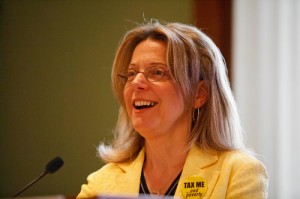
By Murray MacAdam
Poverty’s impact on human health is far more powerful than many people realize, and it’s costing some low-income people years of life.
A forum of faith leaders at Queen’s Park on March 29 heard testimony from two doctors who backed up those findings. The event, sponsored by the Interfaith Social Assistance Reform Coalition, attracted 90 people from across Ontario. Fifteen Anglicans attended, including Bishop Michael Bird of Niagara.
A powerful theological reflection by Rafael Vallejo, a Presbyterian lay minister, drew parallels between the trials of Job and the plight of Ontario’s poor. He challenged religious leaders, legislators and all Ontarians to ask, “Who pays for austerity? Who says there is no choice?” He said, “Compassion calls us to care for each other.”
Dr. Rosana Pellizzari, a public health doctor from Peterborough, outlined how social factors have a strong impact on human health. She noted that men in the highest income group live an average of five years longer than men in the bottom income group, while the equivalent lifespan figure for women is two years. Stress, social isolation, poor quality food and other elements of life for the poor make more of an impact on health than individual lifestyle choices, she said. A recent survey in Peterborough found that more than half of low-income people hadn’t been to a dentist within the last year because they couldn’t afford to do so, a figure more than double that of the affluent.
What society generally thinks of as “health care” is basically “illness care,” said Dr. Pellizzari. Cooking programs and collective kitchens, some held in churches, are making a difference in encouraging good health. A subsidized food box program provides fresh fruit and vegetables. “People love the food box,” she said. “It’s a luxury for them, but they pay for it so they maintain their dignity.”
Dr Pellizzari called for tax increases on the wealthy to counter poverty and improve human health, a goal advocated by a new organization called Doctors for Fair Taxation. Poverty and inequality hurt all of us, she said, not just the poor. “Poor health is everyone’s business. It’s not just about the state of our health care system.”
Another supporter of Doctors for Fair Taxation, Dr. Philip Berger, echoed her call, saying “We need to redistribute wealth. Those who have more should give more.” Dr. Berger, who works out of downtown Toronto, also underscored the severe health costs paid by the poor. For example, 37 per cent of patients at his hospital grapple with mental health issues, versus only 22 per cent of patients for the rest of Toronto. Low-income people also have hight rates of addictions, diabetes and other ailments.
Ontario Cabinet Ministers John Milloy and Kathleen Wynne told the forum that the province’s new budget, while tough, was necessary for safeguarding social programs by reducing the provincial deficit.
MPPs from all three parties, along with Green Party leader Mike Schreiner, also addressed the connection between health and poverty. New Democratic MPP Cheri DiNovo urged forum participants to make their voices heard as consultations on the budget continue among the parties. “Do not buy the austerity theology,” she said, and outlined various ways in which the government could save money and avoid cutbacks in social programs.
The gathering endorsed a hard-hitting statement by the faith leaders present, which says “It is fundamentally unjust to balance the provincial budget on the backs of our most vulnerable neighbours.”
The faith leaders urged the government to honour its Poverty Reduction Act, passed in 2009, by raising social assistance rates at least by the rate of inflation and by implementing an increase in the Ontario Child Benefit for low-income families that the budget postpones until 2013.